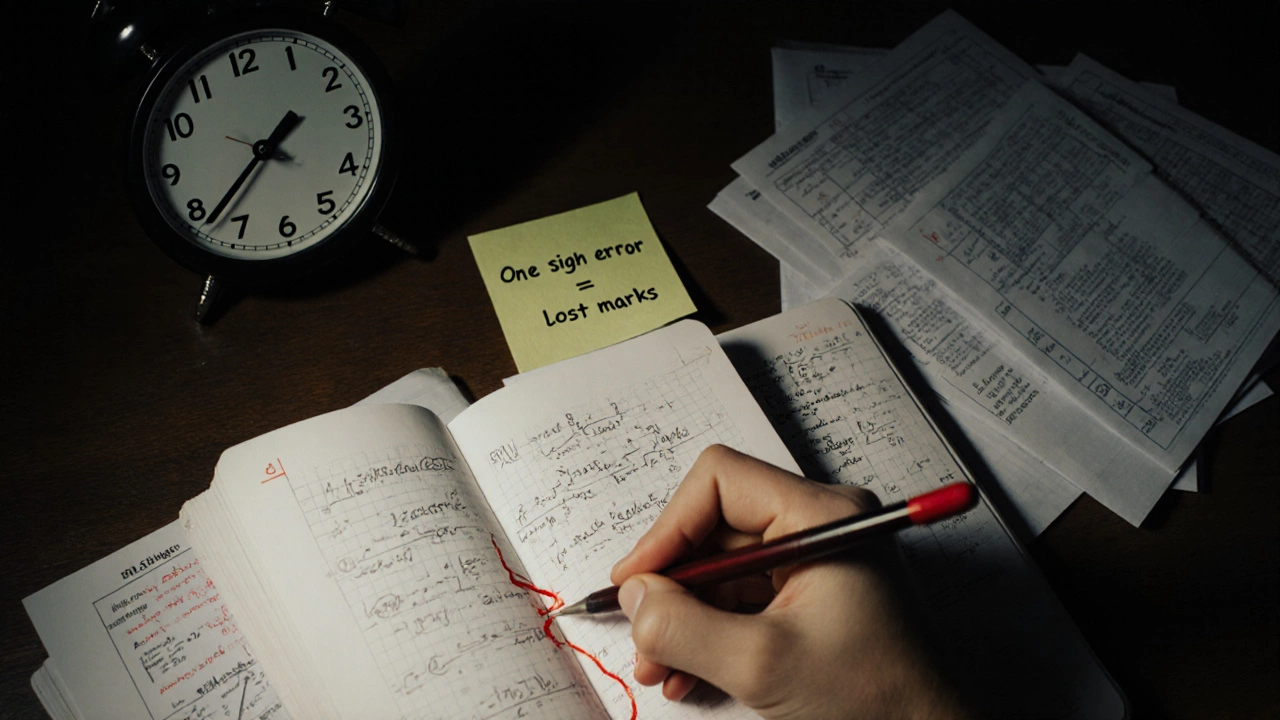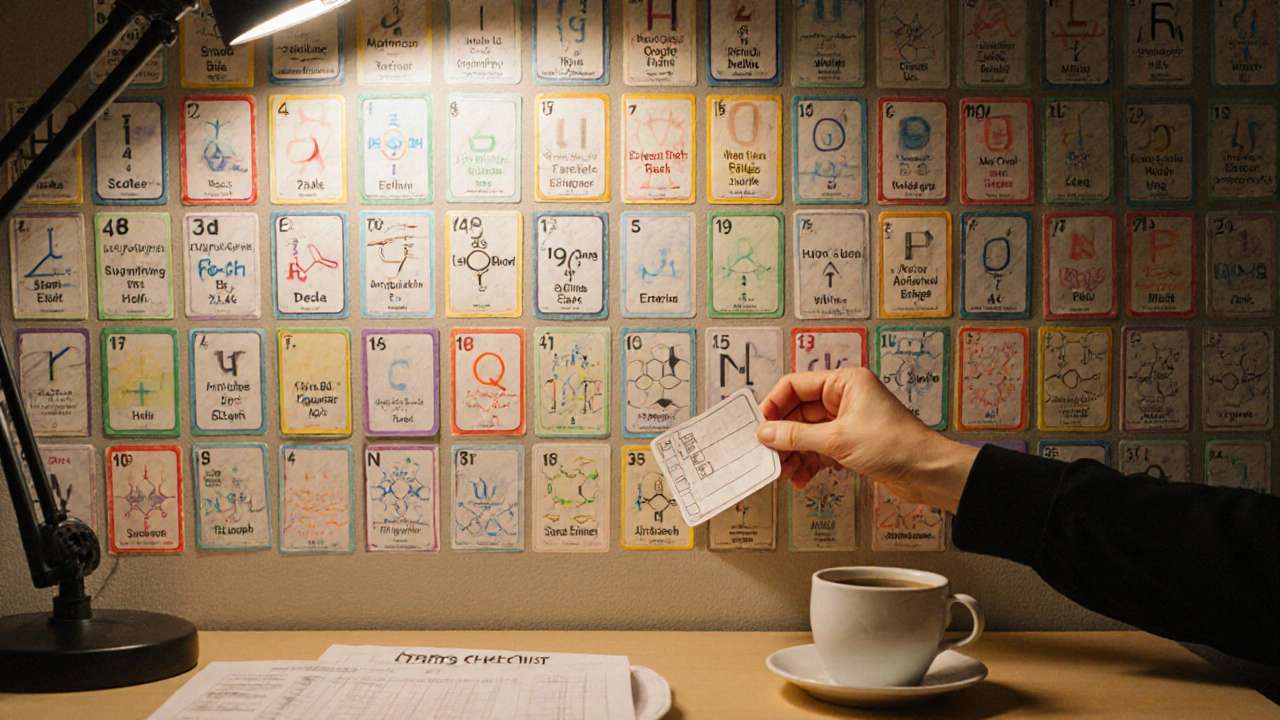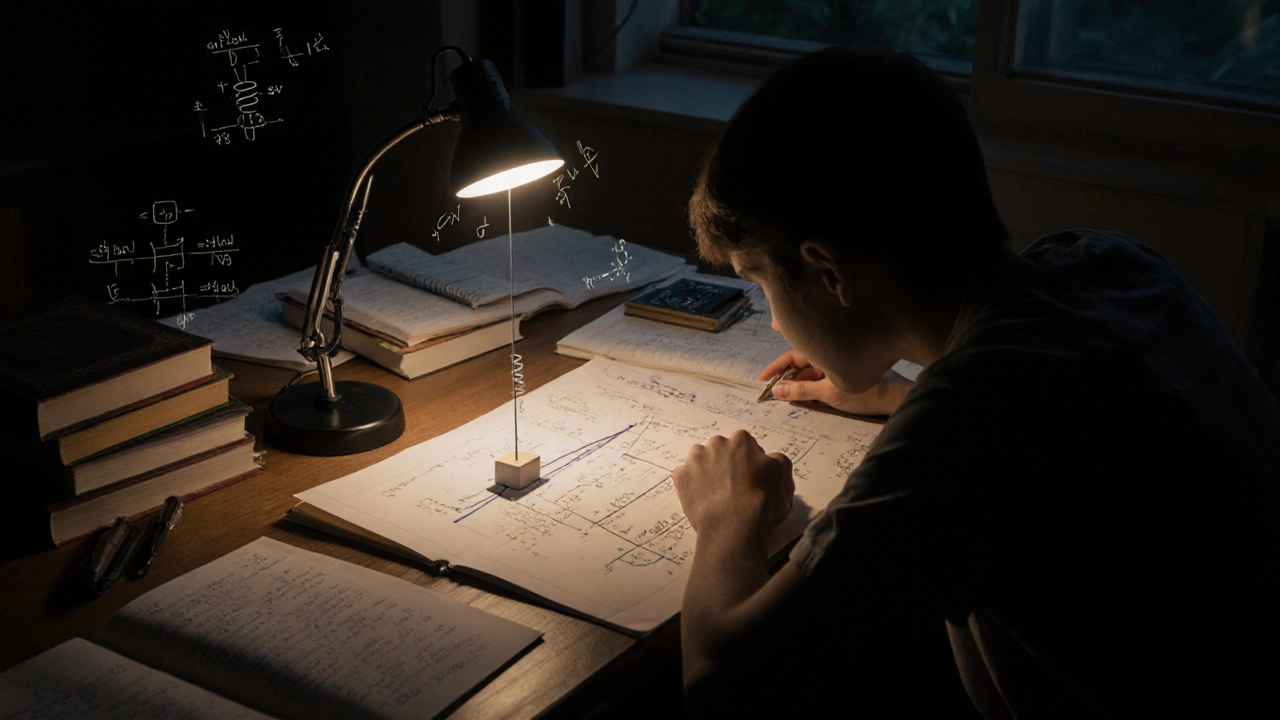JEE Subject Strength Calculator
How Do Your Strengths Compare?
This tool estimates which subject might be easier or harder for you based on your self-assessment. Based on data from IIT Delhi's JEE Advanced analysis (2020-2024).
Your Strength Assessment
Recommended Strategy
If you're preparing for JEE, you've probably heard someone say, Physics is the hardest. Or maybe it’s Math. Or Chemistry. Everyone has an opinion. But what does it actually mean for you-right now, sitting with a stack of books, tired eyes, and a clock ticking down?
The truth? There’s no single answer that fits every student. But there is a pattern. And if you understand it, you can stop wasting time on myths and start focusing on what really matters.
Why People Say Physics Is the Hardest
Physics in JEE isn’t just about formulas. It’s about seeing the world in motion-how forces interact, how energy transforms, how light bends through lenses. You’re not memorizing; you’re building mental models.
Take a typical JEE Advanced question: A block slides down an inclined plane with variable friction, attached to a spring, while a pendulum swings nearby. You need to combine Newton’s laws, energy conservation, SHM, and non-inertial frames-all in one problem. No step-by-step guide. No formula you can plug into. You have to think like an engineer.
According to data from IIT Delhi’s JEE Advanced analysis (2020-2024), Physics had the lowest average score across all candidates-just 42% compared to 51% in Math and 48% in Chemistry. That gap isn’t random. It’s because Physics demands deep conceptual clarity. If your foundation is shaky, you’ll get stuck even on questions that look familiar.
Mathematics: The Speed Trap
Math is the subject where you think you’re doing fine-until the clock runs out.
It’s not that the concepts are harder. Most JEE Math topics-calculus, algebra, coordinate geometry-are taught in school. But JEE doesn’t test your understanding. It tests your speed, accuracy, and pattern recognition under pressure.
A student who solves 15 Math problems correctly in 45 minutes might still score lower than someone who solves 12 with 100% accuracy. Why? Because JEE uses negative marking. One wrong answer cancels out a correct one. And the questions are designed to trip you up-like a quadratic with hidden roots, or a limit that looks like L’Hôpital but needs a trig substitution.
Top performers say Math is the most unforgiving. One misstep in integration, one wrong sign in a determinant, and you lose the entire question. There’s no partial credit. No ‘close enough’.
And yet-Math is also the most predictable. If you practice enough past papers, you start seeing the same patterns. The trick isn’t genius. It’s repetition.
Chemistry: The Memory Game
Chemistry feels easier at first. Organic reactions? You memorize them. Inorganic trends? You learn the periodic table. Physical Chemistry? A few formulas and you’re done.
But here’s the catch: JEE Chemistry doesn’t ask you to apply. It asks you to recall. Exactly.
Like: Which of the following complexes shows geometrical isomerism? Or: What is the IUPAC name of 2-methylbut-2-en-1-ol? Or: What’s the bond order of O₂⁺?
You can’t derive these. You either know them, or you don’t. And the syllabus is massive. From coordination compounds to biomolecules, from solid state to electrochemistry-it’s a jungle of facts. One year, JEE asked about the magnetic moment of [Fe(CN)₆]⁴⁻. Not because it’s hard. But because it’s obscure.
Top scorers treat Chemistry like flashcards. They don’t study it-they test themselves daily. Miss one reaction? You’ll see it again. Miss one exception? It’ll come back in the next mock.

What the Top 1% Do Differently
Let’s cut through the noise. The students who crack JEE with top ranks don’t say, “I’m good at Physics.” They say, “I know where I’m weak.”
They don’t avoid hard topics. They attack them early. They don’t solve 100 problems the same way. They solve 10 problems, then analyze why they got one wrong. They keep an error log-not just the answer, but the thought process that led to the mistake.
One student from Kota, who scored 99.98 percentile, told me: “I spent three weeks on just five Physics problems. Not to solve them. To understand why I couldn’t solve them.”
They also know this: JEE doesn’t test how much you know. It tests how clearly you think under pressure.
Which Subject Should You Focus On First?
Forget “hardest.” Ask: Which subject gives me the most points per hour?
For most students, Chemistry gives the fastest returns. You can improve your score by 15-20 marks in two weeks just by mastering reaction mechanisms and periodic trends. That’s a 500-1000 rank jump.
Math comes next. If you’re comfortable with basics, practicing 20 high-yield topics-like quadratic equations, matrices, definite integrals, and probability-can boost your score by 25+ marks. These topics appear every year, in every variation.
Physics? It’s a long game. You can’t cram it. But if you spend 45 minutes a day on one concept-say, rotational motion or electromagnetic induction-and solve 3 problems daily, you’ll see progress in 30 days. Not overnight. But steady.
Here’s the rule: Start with Chemistry to build confidence. Then sharpen Math for speed. Finally, grind Physics for depth.

Common Mistakes That Make JEE Harder Than It Needs to Be
- Skipping NCERT for Chemistry. It’s not a book. It’s the blueprint. 60% of inorganic questions come straight from NCERT lines.
- Practicing only easy problems. If you’re only solving questions you already know, you’re not preparing-you’re rehearsing.
- Ignoring previous years’ papers. JEE repeats concepts. Not questions. But concepts. The same idea shows up in 2018, 2021, and 2024-just dressed differently.
- Comparing yourself to others. Someone else’s “hard” isn’t yours. Your struggle with calculus isn’t failure. It’s data.
Final Reality Check
The hardest subject in JEE isn’t Physics. Or Math. Or Chemistry.
The hardest subject is yourself.
It’s the voice that says, “I’m not good enough.”
It’s the fear that if you fail, everything’s over.
It’s the exhaustion that makes you skip one more problem.
But here’s what no one tells you: JEE doesn’t care how smart you are. It cares how consistent you are.
One student from Bihar, who started with 30% in mocks, cracked JEE Advanced with a rank under 500. How? He solved 5 problems a day. Every day. For 11 months. No breaks. No excuses.
You don’t need to be the best. You just need to show up.
Is Physics really the hardest subject in JEE?
Physics has the lowest average scores in JEE Advanced, but that doesn’t mean it’s inherently harder. It’s harder because it requires deep conceptual thinking, not memorization. Many students struggle because they treat it like Chemistry-trying to memorize formulas instead of understanding how forces, energy, and motion connect. If you build your intuition step by step, Physics becomes manageable.
Can Chemistry be the easiest subject in JEE?
Chemistry can be the easiest subject to improve quickly-if you focus on the right areas. NCERT is your best friend. Mastering reaction mechanisms in Organic, periodic trends in Inorganic, and key formulas in Physical Chemistry can give you a 15-25 mark boost in weeks. But it’s only easy if you’re consistent. One missed reaction can cost you a question you thought you knew.
Why do so many students fail in JEE Math?
JEE Math isn’t hard because of complexity-it’s hard because of precision. A single sign error, one wrong substitution, or misreading a limit can cost you the entire question. Negative marking makes it brutal. Most students fail not because they don’t know the topic, but because they don’t practice under timed conditions. Speed + accuracy = survival in Math.
Should I focus more on my weak subject or my strong one?
Focus on your weak subject-but only if it’s a high-yield topic. Don’t spend weeks on a rare topic like 3D geometry if you’re missing 5 easy questions in Algebra. Identify your biggest point leaks. Fix those first. Then reinforce your strengths. Your goal isn’t to be perfect in everything. It’s to maximize your score.
How many hours should I study each day for JEE?
There’s no magic number. Some top rankers study 6 hours. Others study 12. What matters is quality. Two focused hours of active problem-solving are better than six hours of passive reading. Track your output, not your time. If you solve 10 problems with full understanding, you’re ahead of someone who did 30 without reflection.
Is coaching necessary to crack JEE?
No. Many students crack JEE without coaching. What coaching provides is structure, tests, and peer pressure. But if you have discipline, access to past papers, and a study plan, you can do it on your own. The key is consistency, not the classroom. Use free resources like NCERT, YouTube channels like Khan Academy, and mock tests from NTA. Build your own system.
What Comes After JEE?
When you get through JEE, you’ll realize something: the hardest part wasn’t the exam. It was the journey.
The late nights. The doubts. The pressure. The moments you wanted to quit.
Those are the things that stay with you. Not the rank. Not the college. But the person you became while fighting for it.
So if you’re still reading this-keep going. One problem. One day. One step at a time.
